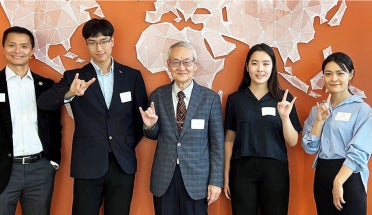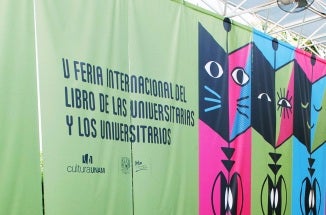
FILUNI Hosts Crucial Conversations on Water and Environment
- Oct 9, 2023
- Global Alumni Relations
- by Alex Briseño
Editor’s Note: This story is part of Texas Global’s series on The University of Texas at Austin’s leadership and activities at FILUNI 2023, a multinational book festival and conference that took place Aug. 29-Sept. 3 in Mexico City. The largest international Longhorn delegation in history — more than 140 people representing 23 units — traveled to the event, which attracted 42,000 attendees from 11 countries.
The University of Texas at Austin is committed to addressing the world’s most pressing energy and environmental challenges. This commitment was on display as UT faculty and researchers engaged a sizable audience at FILUNI during a roundtable session titled “Water and the Environment in Mexico and the United States: Common Challenges, Shared Solutions.”
UT Austin’s multidisciplinary panel of distinguished speakers included David Eaton, Bess Harris Jones Centennial Professor in Natural Resource Policy Studies; Jane Cohen, Edward Clark Centennial Professor in Law; Norma Fowler, professor in the Department of Integrative Biology; and Isabel Keddy-Hector, senior research program coordinator and graduate student in the LBJ School of Public Affairs and Jackson School of Geosciences.
Eaton introduced the topic by calling attention to the exciting news that just three days earlier, the U.S. and Mexican governments had agreed to authorize an 18-month joint study to understand and respond to the increasing salinity in the lower Rio Grande River.
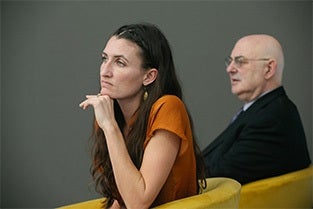
“I have a good story to tell you about cooperation between Mexico and the United States in solving a serious problem along our shared border, the Rio Grande,” Eaton said. "This is the first binational, transboundary research study funded and supported by six different binational, federal and state water agencies involving research teams from two universities, UNAM and UT Austin.”
The study will be implemented as a joint course between UT Austin and UNAM, allowing students to work with sponsoring agencies in the U.S. and Mexico.
The river border between Mexico and Texas stretches 279 miles from below the International Falcon Reservoir to the Gulf of Mexico. Periodic high salinity events in the Rio Grande diminish water quality, reduce crop productivity and increase water treatment costs in a region where the current binational population of 2.7 million people is expected to double by 2045. These events implicate the region’s major water user and largest industry, agriculture, which in 2012 registered an economic impact of more than $1.6 billion in the U.S. alone.
Keddy-Hector presented a 2022 case study on the silver mining industry in Zacatecas, Mexico, as it relates to water quality. With support from Texas Global, Keddy-Hector gained hands-on experience in a Global Career Launch internship, working with partners from the Texas Commission on Environmental Quality, and Mexico’s National Water Commission and Secretary of Environment and Natural Resources.
Their joint research found contaminated water in aquifer-monitoring sites near Mina Peñasquito, the fifth-largest silver mine in the world, with high measurements of iron and arsenic.
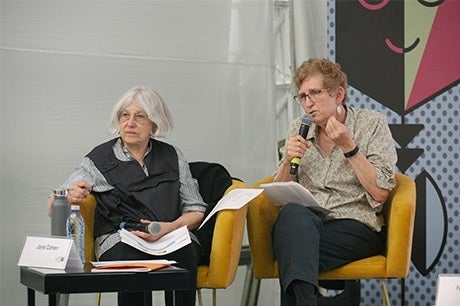
Fowler focused on the need for collaboration between both countries’ biologists to advance knowledge of plants, animals and environment at the border — specifically, how they are affected by construction of the border wall and recent addition of barriers in the Rio Grande.
Cohen furthered the discussion by sharing insight on a book in progress, titled, “To Save a Parched and Drowning City: Mexico City’s Water Crisis: New Actions and Ideas,” which she presented as an invitation to crowdsourcing.
“If you live in Mexico City, you know: You are parched during droughts, but there are also mudslides and flooding when it rains too much. There is not enough water, and the cost of water is also an issue,” Cohen said. “This has been an accumulation of problems for hundreds of years, dating back to the Aztecs and Conquistadors.”
Cohen is interested in the views of people from all backgrounds working to address water issues in Mexico City, people she calls “civic brave hearts.” Her goal is to understand what affects people most and identify unconventional methods they employ to make improvements.
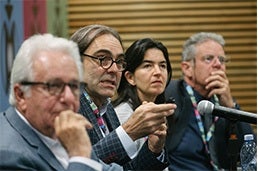
Additional sessions approached the concept of environment from a different perspective. Juan Miró, professor at the School of Architecture, presented a monograph chronicling the work of his Austin-based studio, Miró Rivera Architects. He also participated in a roundtable discussion about the Félix Candela Museum, dedicated to the brilliant Spanish-Mexican architect.
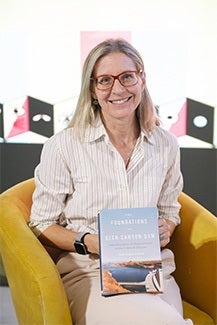
LLILAS Director Adela Pineda and Matthew Butler, associate professor in the College of Liberal Arts, led a presentation on “Behind Indigenous Communal Lands,” a book resulting from the collaboration between UT Austin and Mexico’s Centro de Investigaciones y Estudios Superiores en Antropología Social. This book provides a broad historical review of the privatization of Indigenous lands in the state of Michoacán.
Erika Bsumek, history professor in the College of Liberal Arts, presented her book, “Foundations of the Glen Canyon Dam,” analyzing the historical, political and social context of the controversial structure on the Colorado River in Arizona. Addressing the intertwined stories of the area’s native peoples, the book also evaluates the legacy of the dam for a region whose future regarding water and energy has become uncertain.

